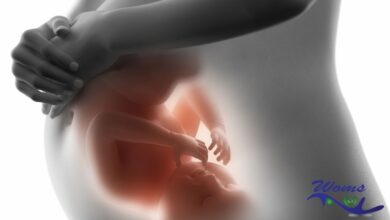Antenatal care: For a healthy mom and a baby

Once your pregnancy has been confirmed, you should see your doctor or a midwife as soon as possible to organize the necessary appointments. Antenatal appointments, also known as antenatal care, are scheduled during your pregnancy. Both the mother and the unborn child require antenatal care. you can check our pregnancy app to track your pregnancy.
Furthermore, women can learn about healthy behaviors throughout pregnancy from competent health staff, better understand warning signals during pregnancy and childbirth, and receive social, emotional, and psychological support during this vital period in their life through this type of preventative health care.
Pregnant women can also get vitamin supplements, hypertension treatment to avoid eclampsia, and tetanus vaccine through antenatal care. This article will help women to learn more about antenatal care and the healthy behaviors during pregnancy.
What Is Antenatal Care?
Did you miss your period? Are you worried you might be pregnant? You can be sure you are pregnant in just a few minutes. A pregnancy testing kit can be used to confirm your pregnancy. Congratulations if you are expecting a child. Knowing about antenatal care is essential for a pregnant lady. Let’s know all detail about antenatal care or prenatal care.
Caring for the health of the mother and the unborn child during pregnancy is known as antenatal care (ANC).
ANC is also called pregnancy care or maternity care or prenatal care. The advice for antenatal care is offered by a midwife or gynecologist.
Objectives of the antenatal care: Before delivery, Ultimately goal to have a healthy child and mother before deliver
- To improve, protect and maintain the health of the mother during pregnancy.
- To identify the high risk of the pregnancy so that special attention may be given to them.
- To foresee the complication and to prevent them.
- To remove the anxiety and dread of the mother associated with delivery.
- To reduce infant and maternal mortality and morbidity.
- To educate the mother regarding child care, nutrition, personal hygiene, etc.
- To sensitize the mother regarding family planning.
Antenatal visit
There are three types of antenatal visit:
- Standard or ideal visit
- Intermediate visit
- Minimum visit
Standard visit: 14 in number
- Once in a month during first 7 months of pregnancy -7
- Twice in next month-2
- Then once in week -5
Intermediate visit: 5 in number
- First visit: 12 weeks
- Second visit: 20-22 weeks
- Third visit: 28-32 weeks
- Fourth visit: 34-38 weeks
- Fifth visit: 38 weeks
Minimum visit: 3 in number
- First visit: 20 weeks (as soon as pregnancy is known)
- Second visit: 28-32 weeks
- Third visit: 36-38 weeks
Activities of a doctor during the first antenatal visit
- Registration
- History taking
- Examination
- Investigation
- Advice
- Others
Registration
The names of the pregnant women will be enlisted in the register during the first antenatal visit. A registration card will be given to the women with a registration number. However, they will be told to bring the card along during every visit. To allow them to compare their current findings to earlier ones.
History taking
- Brief menstrual history including the last menstruation period (LMP).
- Present and past obstetrical history.
- Family history- Diabetes Mellitus, Hypertension, bronchial asthma.
- Drug history with allergy
- Social history- education, occupation, economic condition.
Antenatal Examination
General examination
- Height
- Weight
- Anemia
- Oedema
- Jaundice
- Pulse
- Bp
Local examination
- Height of uterus
- Lie of baby
- Presentation (Head of the baby towards the lower end of the uterus)
- Fetal heart sound
Investigation
Essential investigation
- Urine for routine examination
- Blood for hemoglobin (Hb)
- Sugar: if present, then gestational diabetes
- Pus cell: if more than 3, then UTI (urinary tract infections).
- Albumin in urine: if present, eclampsia toxemia
Other investigations
- Blood for grouping with Rh factor
- Random blood sugar (RBS)
- HBsAg (hepatitis B)
- VDRL (Syphilis)
- Ultrasonography
Advice during antenatal care
Pregnant women should be given the following advice based on:
Diet
High nutritious meals with the necessary vitamins and minerals should be taken during the antenatal period. Nutritional diet includes milk, egg, meat, fish, yogurt, and cheese. (Usually, a pregnant woman gets 12 kg weight more during pregnancy). These dietary foods are good sources of protein, vitamin D, and calcium.
In addition, the pregnant mother should also take prenatal vitamins which are hard to get from foods such as folic acid and iron. The foods that are rich in iron are baked potatoes, beans, spinach, cashews, and whole grains. Broccoli, cabbage, peas, chickpeas, and grains are all good sources of folic acid.
Foods to avoid during antenatal periods
Here is the list of some foods that should be avoided during the antenatal period:
- High mercury fish: Fish that contains a high amount of mercury are king mackerel, marlin, orange roughy, shark, ahi tuna, and bigeye tuna.
- undercooked or raw fish
- undercooked or raw meat
- caffeine
- raw eggs
- organ meat
- Alcohol
Personal habit
- Personal hygiene: eg: daily bath, clean cloth, oral hygiene.
- Rest and sleep: eight hours sleep at night and two hours sleep at day time.
- Bowel: constipation should be avoided.
- Work: Normal household work is allowed. Physical and other menial works may affect the baby.
- Smoking: Smoking is one of the important causes of LBW (low birth weight). The weight of a baby of a smoking mother is about 170 gm lesser than that of a non-smoking mother. (Nicotine causes vasoconstriction, that’s why weight is less).
- Sexual intercourse:
- This should be done with caution especially during the last trimester because of the health of the unborn child. However, you can learn more about different sex positions during pregnancy.
- Drugs: Some drugs should not be taken during pregnancy because these drugs may affect the baby. The drugs are enlisted below:
- Thalidomide
- Tetraogenic
- Hypnotics
- Analgesic or painkiller like aspirin and ibuprofen and naproxen.
- Cough and cold medicines that contain guaifenesin. You can also read about cough medicine for kids.
- Bismuth subsalicylate
8. Radiology/Xray: Xray should not be done during the first four-month of pregnancy.
Warning signs
A pregnant woman should be advised to report to her doctor immediately she spots one of the below symptoms:
- Severe headache
- Fit or convulsion
- Swelling of feets
- Excessive bleeding
- The blurring of a vision
- Any unusual symptoms
Summary
Every pregnant mother must have some knowledge about antenatal care. However, antenatal care is going to improve, protect and maintain the health of every mother during the pregnancy period. We have discussed all the detail about antenatal care in the principal article. If you do have any queries about pregnancy cares please do let us know by commenting below in the comment section.




